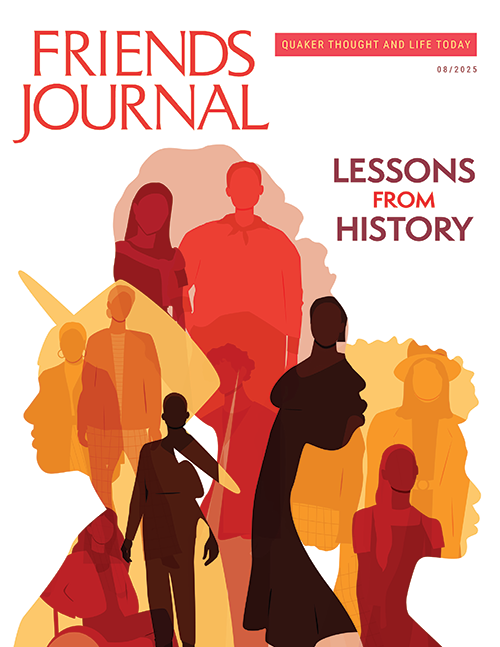Mixed reactions to reviving Friends
I felt discouraged after reading the June-July Friends Journal (Quaker Revivals), which seemed to have a pervasive concern that Quakers are aging and dying out. This is not the spiritual reality that I live in. I wonder if the concern is rooted in fear.
If Protestant churches want to have rock and roll music and pastors who are charismatic speakers, in order to improve membership, they are welcome to do whatever they want—it’s not my business. But the sense I have of my meeting is that our members fully support our current, mostly quiet and contemplative practice. Wanting enhanced attendance through a more attractive format than “quietism” does not reflect my values and is not how I want to live.
It seemed that a strong pitch was being made against Quietism and the values of the late seventeenth century. I was left hanging as to what current quietest practices are being referred to, that are seen as problematic. The strong encouragement of evangelism and some sort of revival in the June-July issue seemed to suggest that this is the way for future membership decline to be averted.
I would have appreciated an explanation of how meetings whose members valued the customary silence punctuated by inspired messages might be expected to adapt to the proposed changes.
Rob Dreyfus
Swarthmore, Pa.
From Martin Kelley’s “Among Friends” editorial to the “Love Your Neighbor Is a Call to Action” viewpoint of Tim Gee, every contribution to the recent Quaker revivals issue of Friends Journal was interesting and inspiring. I particularly enjoyed Catriona Forrest’s “Breaking the Old Rules: Creating Space for Quaker Revival.” Embracing newly opened space (and finding innovative ways to fill it) is an organic, sustainable way to approach the life-cycle of meetings. I’ll be thinking about that, and the other articles and poems in this issue, for a long time.
Friends Journal is a treasure. I am grateful to you and your staff for your efforts.
Vicki Winslow
Liberty, N.C.
The June-July issue of Friends Journal relating to Quaker revival is excellent. I would like to add my own personal thoughts to this conversation. As a Friend for over 75 years, I have seen many changes. I have always found us experimenting with our spiritual lives, not forgetting our past history but using it to face the present and the future. Here are some examples that have affected my life.
Around the time when American Friends Service Committee turned from a focus on relief and reconstruction work to advocacy, it published a pamphlet (“Peace in the Middle East”) seen by many as pro-Palestinian.
One evening at our AFSC-New York Regional Executive Committee meeting, the Jewish Defense League stormed into our meeting. This small band would not let us continue. We wondered whether we should call the police. Our solution was to hear their concerns and position and also ask them to listen to our Quaker position. The conclusion, after a long night, was to hold future meetings together. It was a bleary-eyed group that went home the next morning.
As members of the national AFSC Executive Committee during the Vietnam War, we held a silent vigil outside the White House in Washington and requested a meeting with our “Quaker” President Nixon. He refused but sent out Henry Kissinger, then the U.S. national security advisor, who took the time to listen to our concerns about the need for nonviolence. These experiences and more helped to renew and revitalize my Quakerism. We are Friends of Truth and the Light.
Quakers have a history of responding to situations, especially when we know how important it is to uphold our testimonies. I believe there is an openness to constant renewal and revitalization. George Fox and those Valiant 60 knew it wouldn’t be easy. In every decade and in every generation, Friends have had to face the world with love and understanding, never forgetting the very foundation that our traditions and testimony rest on. I believe we still have an important message to share with all of humankind.
George Rubin
Medford, N.J.
A plea to avoid inflammatory language
Several months ago, there was a QuakerSpeak interview with American Friends Service Committee (AFSC) general secretary Joyce Ajlouny entitled “What Does Just Peace in Palestine and Israel Look Like?” (QuakerSpeak.com, Mar.). In this interview, she specified that she wanted Palestinians to live “from the river to the sea.”
She implied that Israelis could live together with Palestinians, but her choice of words is chilling. “From the river to the sea” is a rallying cry of Hamas, whose attack on and abduction of 251 civilians in Israel sparked the current war that Aljouny is decrying (Hamas enshrined it in their 2017 charter). The Anti-Defamation League considers it to be an antisemitic slogan. Far from words of peace and freedom, this phrase is used to incite violence against Israelis and diaspora Jews.
I call on Ajlouny and AFSC to apologize for the inflammatory language, and make future appeals for Palestinian liberation without hate speech. And I call on Friends who want a just peace in Palestine and Israel to do the same.
Roscoe Mathieu
San Luis Obispo, Calif.
Love of silent worship
I attend a silent, liberal meeting, Fairhope (Ala.) Meeting. Peter Blood-Patterson’s “Coming Out from Under Our Bushel” (FJ June-July) is well written, welcome, and touches on concerns I have. The value I obtain from attending our silent worship is hard to explain; suffice it to say that the discipline of our meeting allows me to see glimmers of the light and, I hope, live my life in a more moral and meaningful way. I would not feel comfortable in other traditions, Quaker or otherwise, which dictated specific theology, including a belief in biblical teachings and stories (two things that I believe to be different). I highly doubt the practices of my meeting and my own personal religious discipline would be seen as being that of a Friend by the early Quakers but, after reflection, I realize that the concern is irrelevant, as the value I get out of the discipline of our Quaker worship is so personal as to mean that others’ acceptance and approval is almost irrelevant.
Harry Pond
Mobile, Ala.
Showing up together
It’s wonderful to read a piece in Friends Journal lifting up children’s religious education, and fitting that it’s part of the Quaker revivals issue (“Sparking Still” by Suzanne W. Cole Sullivan, FJ June-July). In my ministry travels among Friends, I encounter meetings that are growing where there’s a focus on the kinds of community and creativity that Suzanne describes, that is often grounded in a concern to support young families. A children’s program also serves the circles of people around the children themselves—the adults in their families and the meeting as a whole. What we offer to families for their children—whether it’s a scholastic model with “lessons,” story and play, childcare, or welcome in worship—supports the adults’ experience of inclusion and belonging. The “showing up together,” with children being “known and recognized,” is vital. Beyond content or its delivery in a children’s program, there is a growing edge that expands when we center belonging.
Melinda Wenner Bradley
Glen Mills, Pa.




ON Inflammatory language: What’s inflammatory to one, is a cry for peace and a homeland to another.
Coming from a Quaker of Jewish descent, whose parents were Holocaust survivors, and who is not a Zionist, and who is vehemently opposed to what Israel is doing to the Palestinians in both Gaza and The West Bank, many Jews find the expression “From the River to the Sea” to be offensive, and even antisemitic, while many Palestinians feel it is a reasonable request, if not rallying cry for what was promised to them when the state of Israel was established, and what is being denied to them now: the simple right to live in peace and with hope in the lands between the Jordan and the Mediterranean which were theirs before, and are being taken from them violently, genocidally, and cruelly, now.
This language does NOT have to be interpreted as either anti-Zionist, or antisemitic based on either its historical or current usage. Many Jews for Peace proclaim this expression of hope for a two-nation peaceful solution without intending to threaten Israel or Jews in general. I am one of those, and there are thousands like me.
So yes, the language is inflammatory to some, and rightfully inspirational to others. Why should Joyce Ajlouny not be able to represent the Palestinian hope, especially in the face of violence that Israel is perpetrating on Palestinians in Gaza and the West Bank today? Maybe it will inflame people to think, and hope, and work towards peace and an equitable solution.
On inflammatory language: The Holocaust caused horrific death, destruction, and trauma that continue through generations to this day, as witnessed in the painful Forum letter from Roscoe Mathieu, and my heart goes out to the writer.
But I gently question whether demanding an apology for “inflammatory language” and accusing Aljouny of engaging in “hate speech” will lead to the healing that is clearly so desperately needed.
In the QuakerSpeak video, Aljouny expresses her hope that “we can live in that beautiful piece of land from the river to the sea together.”
Inflammatory? I pray that this Forum be a place for the healing to begin so that everyone can listen to Aljouny’s words with love, and hear them as a promising bridge to hope, friendship, and reconciliation.